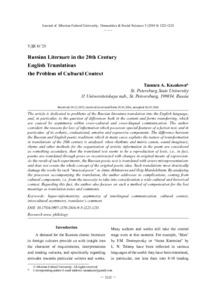Russian Literaure in the 20th Century English Translations the Problem of Cultural Context
Скачать файл:
URI (для ссылок/цитирований):
https://elib.sfu-kras.ru/handle/2311/20271Автор:
Kazakova, Tamara A.
Казакова, Т.А.
Дата:
2016-05Аннотация:
The article is dedicated to problems of the Russian literature translation into the English language,
and, in particular, to the question of differences both in the content and forms transferring, which
are caused by asymmetry within cross-cultural and cross-lingual communication. The author
considers the reasons for loss of information which possesses special features of a fiction text, and in
particular, of its esthetic, evaluational, emotive and expressive components. The difference between
the Russian and English poetic traditions which in many cases explains the nature of transformation
in translations of the 20th century is analyzed: when rhythmic and metric canon, sound imaginary,
rhyme and other methods for the organization of artistic information in the poem are considered
as something secondary, then the translated text seems to be a reproduction of lexis, i.e., in fact,
poems are translated through prose or reconstructed with changes in original means of expression.
As the result of such experiments, the Russian poetic text is translated with severe misrepresentations
and does not create the whole concept of the original poetic idea. Such translations most drastically
damage the works by such “musical poets” as Anna Akhmatova and Osip Mandelshtam. By analyzing
the processes accompanying the translation, the author addresses to complications, coming from
cultural components, i.e. from the necessity to take into consideration a wide cultural and historical
context. Regarding this fact, the author also focuses on such a method of compensation for the lost
meanings as translation notes and comments В статье затрагиваются проблемы перевода русской литературы на английский язык, в
частности, разночтений как в отношении содержания, так и в передаче формы текста,
обусловленных асимметричностью межъязыковой и межкультурной коммуникации.
Рассматриваются причины потери информации, составляющей особенности художественного
текста, в том числе ее эстетических, оценочных, эмотивных и экспрессивных компонентов.
Анализируется различие русской и английской традиций стихосложения, во многом
определяющее характер трансформации при переводе русской поэзии ХХ века на английский
язык, когда ритмометрический канон, звукопись, рифма и иные способы стихотворного
упорядочения художественной информации рассматриваются как нечто второстепенное
и переводной текст представляет собой воспроизведение словесного состава, то есть, в
сущности, стихи либо переводятся прозой, либо реконструируются с изменениями авторских
средств выразительности. В результате таких переводческих экспериментов русский
поэтический текст передается с серьезными искажениями и не дает полного представления
о поэтической мысли оригинала. Особенно страдают от такого перевода произведения
наиболее «музыкальных» поэтов, как Анна Ахматова или Осип Мандельштам. Анализируя
процессы, сопровождающие перевод прозы, мы обращаемся к осложнениям, вызванным
культурно-обусловленными компонентами, то есть необходимостью учета широкого
культурно-исторического контекста. В связи с этим фактором рассматривается такой
способ компенсации утраченных смыслов, как переводческие примечания и комментарии

